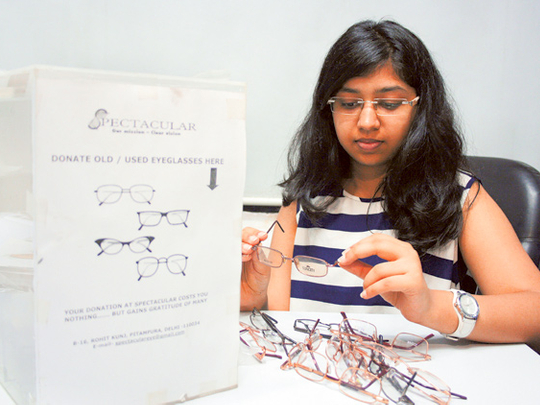
New Delhi: Moved by the struggles of people who are unable to afford even a pair of spectacles, which can be termed as a basic need for those with an incorrect vision, young Aarushi Gupta has come to the rescue of such people.
The 17-year old has started a unique initiative by collecting used spectacles and donating them to the NGOs, who make them usable for the needy. In addition, Aarushi has been researching on the subject and came across some startling facts. She says, “From knowing about the enormous number of people who need spectacles to chancing upon Vision 2020: The Right to Sight, a national forum for eliminating avoidable blindness by year 2020, the information I gathered has been an eye-opener. I am of the belief that in the times to come, I shall be able to take my drive to effective heights.”
She speaks to Gulf News in an exclusive interview.
GULF NEWS: What led you to the idea of helping people at such a young age?
AARUSHI GUPTA: As a volunteer, I used to attend the Jan Sewa Foundation (JSF) camp near my house in west Delhi’s Pitampura. They provide free eye check-ups and charge nominal fee for providing spectacles. At one such occasion, I saw an old man waiting in the queue. But when his turn came, he did not have the money to buy a pair of spectacles. I thought it was a very normal thing to pitch in and offered him the amount I had in my pocket. He thanked me profusely, which really moved me. The cost of a spectacle was just Rs.35 and I was shocked to realise that there were people who couldn’t afford even that much for something they needed.
So, when did the drive to collect the spectacles begin?
Studying in Modern School, where it is mandatory to put in at least 30 hours of community service every month, it was in my psyche to care and share. So, though I was very young, that incident stayed with me. I had few pairs of specs lying unused at home and asked the people at the camp if I could offer them so that others could benefit. I have been wearing specs since 2009. The pairs had been discarded due to change in eyesight number or merely because the frames had gone out of fashion!
The JSF people were happy to help, which encouraged me. In Class 10, I was mature enough to take it upon myself and began giving presentations. It started from offices of my parents, who are both chartered accountants and then to other corporate. The results boosted my morale and with the assistance of my parents, we printed leaflets and posters, which we put in schools and offices.
What message do you spread during presentations?
My request to people is to donate used spectacles to help others overcome their vision problems, which is adversely impacting their education, productivity, employability and quality of life. It means that some people will be able to get jobs and support their families; a child will be able to succeed in school; a senior citizen will be able to live an independent life. Thus, a simple act of charity will impact many lives for years to come.
What has been the outcome and what strategy is used to collect the unused specs?
Till now the ‘Spectacular Drive’, as it is called, has benefitted over 1,500 people. The strategy applied is to first give the presentation and then set up a dropbox at the venue for over a week or 10 days. This way, we have been able to collect from 2 to 50 pieces from each locale. From some opticians I get over a 100 in one go, as they do not keep the fairly old ones in their outlets for long.
How do you distribute them among the needy?
All this is done through NGOs I’m in touch with. These include: The Jan Sewa Foundation, Helpage India and Goonj, who in turn make these usable for those who cannot afford to buy specs.
What research did you go through in your pursuit to help others?
To take the drive further, I researched online and was startled to find that over 517 million people worldwide and 153 million people in India require spectacles. It wasn’t about the blind, but about people who needed, but didn’t have access to them. I can imagine their predicament, as I have first-hand knowledge of it. I am partially blind without wearing specs and know that it’s a handicap to not have a perfect vision.
I also came across Vision 2020, of which film star and Member of Parliament Hema Malini is the brand ambassador. The joint global initiative by World Health Organisation and International Agency for the Prevention of Blindness, it is striving for an India free of avoidable blindness.
What have been the pros and cons of your mission?
I am glad that my initiative is being recognized, as I recently bagged the Pramerica Spirit of Community Award and the Tiranga Badge award. These awards are given to young people who are into extraordinary community services.
The only drawback I see, as of now, is that people are still to be made aware that spectacles that are of no use should not be thrown into the garbage bins. Not only can they be of use to someone, throwing them is an environmental hazard. Recycling of used frames also means lesser amount of metals and plastics ending up at landfills and thus there would be reduction in carbon emissions.












